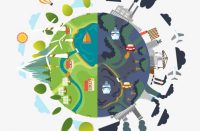Around the year 2000, I attended a conference organized by the Council of Canadians about the risks associated with genetically modified organisms. At some point during the proceedings, an extraordinary thing happened. One of the speakers, professor Ann Clark (then of Guelph University) rose and said the following: the problem with GMOs is they’re so new that we don’t even know what questions to ask about them. That statement was spectacular because it expressed profoundly our relationship to a whole range of new technologies, including nanotech.
Around the year 2000, I attended a conference organized by the Council of Canadians about the risks associated with genetically modified organisms. At some point during the proceedings, an extraordinary thing happened. One of the speakers, professor Ann Clark (then of Guelph University) rose and said the following: the problem with GMOs is they’re so new that we don’t even know what questions to ask about them. That statement was spectacular because it expressed profoundly our relationship to a whole range of new technologies, including nanotech. We need to investigate their rewards and costs, but don’t yet know where to shine our light.
As The Nano Revolution makes clear, the nanotech world – a universe of particles a millionth of a millimeter thick – might bring considerable benefits. David Suzuki, who narrates this three-part series in his television program, The Nature of Things, says nano-based medicine (which is already practiced in some US hospitals) might allow us to regenerate brain cells and improve the lives of Alzheimer patients. It could also permit the creation of an “artificial nose” capable of detecting the early signs of lung cancer in a person’s breath.
Nanotech might also be a boon to environmental protection. Nano-based fuel additives could reduce the pollution emitted by diesel-powered buses, while nanoparticles of ferrous oxide (rust) could remove arsenic from drinking water. The current arsenic-removal system is expensive; nano could provide a cheaper alternative.
Perhaps the most exciting application is in solar energy. The University of Toronto’s Ted Sargent has developed nano-based cells that, unlike earlier models, engage the full spectrum of the sun’s light and enjoy very significant electricity output. Nano could vastly increase solar power’s efficiency – to the point where it competes favorably with nuclear and coal.
But as Suzuki is quick to acknowledge, the nano-world could also be frightening. Nano surveillance systems might help government and corporations keep tabs on us and track us down. They could threaten privacy and, at the extremity, facilitate the workings of a police state. The Nano Revolution includes short dramatized sequences in which actors offer a glimpse of possible futures. In one vignette, a woman walks a city street attempting to get into restaurants and stores; she’s barred from entering because nano systems tell the businesses she’s not a member.
Suzuki also says many nanotechnologies are patented, raising the question of whether their benefits would be enjoyed universally. His attention to this political dimension is commendable. High-tech cancer treatments only cure you if you can afford them. Similarly, brain-cell-regeneration techniques might well be unavailable to those on fixed incomes.
The program raises an objection to nano that is quite remarkable: by conquering illness it might allow us to live too long. One of the dramatized scenes suggests that if the technology permits a person to outlive all her friends, the resulting life is not worth having. That’s an astounding insight from a publicly funded program produced by the CBC, made in a society that generally takes longevity as an unalloyed good. With great wisdom, the dramatized episode concludes, “It was a mistake to think that the end of disease would be the end of suffering.”
There’s also a sense in which nanotech is fundamentally at odds with what the world needs today. At one point, the program tells us nano is all about “defying limits.” But don’t we need, precisely now, to accept limits? Aren’t we increasingly aware that the Earth’s capacity to absorb human projects is finite?
Perhaps the fairest thing to say is that the full meaning of nanotech eludes us. Do these particles harm ecosystems? Do they threaten human health? Do they provide net benefits? Professor Richard Owen of the University of Exeter tells us it will be decades before we have good answers. Professor Mark Wiesner of Duke says that, at present, we don’t even know what a dangerous nanoparticle would look like; we won’t know it when we see it.
Which brings us back to the overarching issue articulated by professor Clark and expressed as well in this program: nanotech is so new that we lack not only answers, but also questions. It may behave in ways we cannot conceive of. Many technologies have these “unknown unknowns,” but because nano’s impact is so far-reaching, absence of knowledge is particularly worrisome here. The Nano Revolution is superb in giving voice to this foundational problem.
The Nano Revolution, directed by Mike Downie, Canada: Canadian Broadcasting Corporation, 2013, 135 minutes
Reviewer Information
Gideon Forman is a long time peace and environmental activist.











